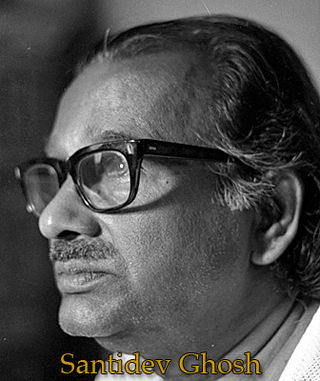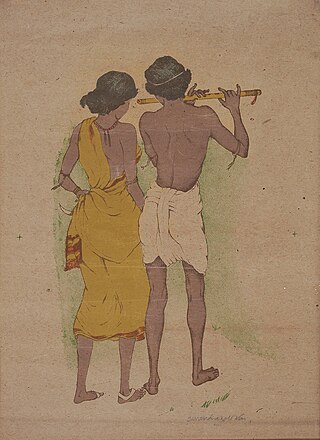
"Jana Gana Mana" is the national anthem of the Republic of India. It was originally composed as Bharoto Bhagyo Bidhata in Bengali by polymath Rabindranath Tagore on 11 December 1911. The first stanza of the song Bharoto Bhagyo Bidhata was adopted by the Constituent Assembly of India as the National Anthem on 24 January 1950. A formal rendition of the national anthem takes approximately 52 seconds. A shortened version consisting of the first and last lines is also staged occasionally. It was first publicly sung on 27 December 1911 at the Calcutta Session of the Indian National Congress.

Rabindra Bharati University is a public research university in Kolkata, India. It was founded on May 8, 1962, under the Rabindra Bharati Act of the Government of West Bengal in 1961, to mark the birth centenary of the poet Rabindranath Tagore. It is located at the Tagore family home, Jorasanko Thakur Bari. The university offers undergraduate and postgraduate programmes in Performing Arts and Visual Arts under the Faculty of Fine Arts, Humanities, Social Sciences and other subjects under the Faculty of Arts.
Brahmo Samaj is the societal component of Brahmoism, which began as a monotheistic reformist movement that appeared during the Bengal Renaissance.

Sharmila Tagore is an Indian actress primarily known for her work in Hindi and Bengali films. Known for her acting range and beauty, Tagore is a recipient of two National Film Awards, a Filmfare Award and the Filmfare Lifetime Achievement Award for her contributions to Hindi cinema. In 2013, the Government of India, honoured her with Padma Bhushan, India's third highest civilian honour for her contributions to the Indian culture through performing arts.
Jorasanko Thakur Bari in Jorasanko, North Kolkata, West Bengal, India, is the ancestral home of the Tagore family. It is the birthplace of poet Rabindranath Tagore and the host of the Rabindra Bharati University campus.

Rabindra Sangeet, also known as Tagore Songs, are songs from the Indian subcontinent written and composed by the Bengali polymath Rabindranath Tagore, winner of the 1913 Nobel Prize in Literature, the first Indian and also the first non-European to receive such recognition. Tagore was a prolific composer with approximately 2,232 songs to his credit. The songs have distinctive characteristics in the music of Bengal, popular in India and Bangladesh.

'Prince' Dwarakanath Tagore was one of the first Indian industrialists to form an enterprise with British partners. He was the son of Rammoni Tagore, and was given in adoption to Rammoni’s elder brother Ramlochan Tagore. He was the scion of the Tagore Family of Calcutta, father of Debendranath Tagore and grandfather of Rabindranath Tagore.

Abanindranath Tagore was the principal artist and creator of the "Indian Society of Oriental Art". He was also the first major exponent of Swadeshi values in Indian art. He founded the influential Bengal school of art, which led to the development of modern Indian painting. He was also a noted writer, particularly for children. Popularly known as 'Aban Thakur', his books Rajkahini, Buro Angla, Nalak, and Khirer Putul were landmarks in Bengali language children's literature and art.

Visva-Bharati is a public central university and an Institute of National Importance located in Shantiniketan, West Bengal, India. It was founded by Rabindranath Tagore who called it Visva-Bharati, which means the communion of the world with India. Until independence it was a college. Soon after independence, the institution was given the status of a central university in 1951 by an act of the Parliament.

Sangeet Natak Akademi is the national level academy for performing arts set up by the Government of India.

Nandalal Bose was one of the pioneers of modern Indian art and a key figure of Contextual Modernism.

Rabindranath Tagore was an Indian poet, writer, playwright, composer, philosopher, social reformer and painter. He reshaped Bengali literature and music as well as Indian art with Contextual Modernism in the late 19th and early 20th centuries. Author of the "profoundly sensitive, fresh and beautiful" poetry of Gitanjali, he became in 1913 the first non-European and the first lyricist to win the Nobel Prize in Literature. Tagore's poetic songs were viewed as spiritual and mercurial; however, his "elegant prose and magical poetry" remain largely unknown outside Bengal. He was a fellow of the Royal Asiatic Society. Referred to as "the Bard of Bengal", Tagore was known by sobriquets: Gurudeb, Kobiguru, and Biswokobi.

Suchitra Mitra was an Indian singer, composer, artist exponent of Rabindra Sangeet or the songs of Bengal's poet laureate Rabindranath Tagore, professor, and the first woman Sheriff of Kolkata. As an academic, she remained a professor and the Head of Rabindra Sangeet Department at the Rabindra Bharati University for many years. Mitra was a playback singer in Bengali films and was associated for many years with the Indian People's Theatre Association.
The Tagore family has been one of the leading families of Kolkata, India, and is regarded as one of the key influencers during the Bengali Renaissance. The family has produced several people who have contributed substantially in the fields of business, social and religious reformation, literature, art and music.

Santidev Ghose was an Indian author, singer, actor, dancer and maestro of Rabindra Sangeet.
Bharoto Bhagyo Bidhata is a five-stanza Brahmo hymn in Bengali. It was composed and scored by Nobel laureate Rabindranath Tagore in 1911. The first stanza of the song has been adopted as the National Anthem of India.

Surendranath Kar was an Indian artist and architect, known for amalgamating the Indian architectural style with western and eastern styles of architecture. Born in 1892 in British India, Kar did his primary learning of art under his cousin, renowned Bengali painter, Nandalal Bose, and Abanindranath Tagore, the nephew of Nobel Laureate, Rabindranath Tagore. Later, he joined Vichitra Club, founded by the Tagore family, as a teacher of art. In 1917, when Tagore set up Brahmacharyasrama, the precursor of later day Shantiniketan, he joined the institution and worked as an art teacher. Two years later, he moved to Kala Bhavana of Tagore as a faculty member.
The Union Bank was a bank founded in the year 1828 in British India by Prince Dwarkanath Tagore. The bank was the fourteenth oldest bank in India.

Satyendranath Tagore was an Indian civil servant, poet, composer, writer, social reformer and linguist from Kolkata, West Bengal. He was the first Indian who became an Indian Civil Service officer in 1863 He was a member of Bramho Samaj.

The 1913 Nobel Prize in Literature was awarded to the Bengali polymath Rabindranath Tagore (1861–1941) "because of his profoundly sensitive, fresh and beautiful verse, by which, with consummate skill, he has made his poetic thought, expressed in his own English words, a part of the literature of the West." He is the first and remains only the Indian recipient of the prize. The award stemmed from the idealistic and accessible nature of a small body of translated material, including the translated Gitanjali.













